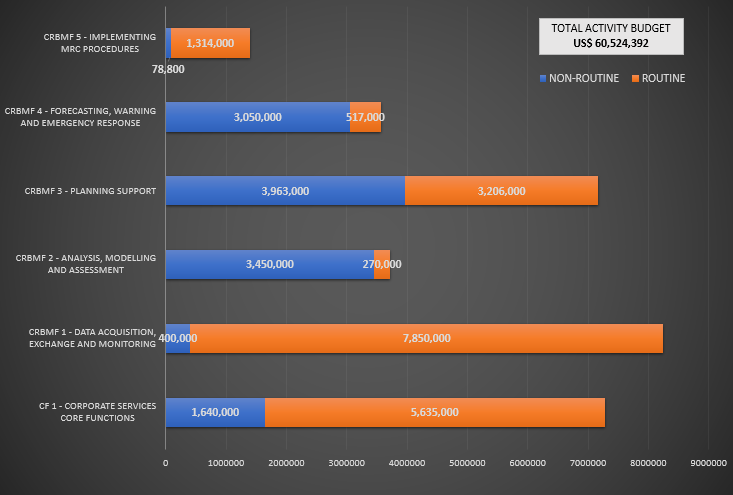Funding of BDS 2021-2030 and SP 2021-2025
Financing development opportunities. Most of the development opportunities in the hydropower, navigation, irrigation, and industry (mining, forestry, tourism, aquaculture) sectors will be largely financed by the private sector (and ‘state-owned companies’) through debt and equity financing.
Most of the development opportunities in the environmental and social sectors will need to be financed through national public budgets and international and regional loans and grants. There will be opportunities to benefit from innovative financing arrangements, such as attracting foreign carbon offsetting funds for reforestation of watersheds. The large needs for flood and drought protection will need to be integrated to the extent possible in already planned sectoral development together with the newly identified (joint) multi-purpose storage projects (for flood protection, hydropower, irrigation, navigation, etc.). The remainder will need to be financed through national public budgets with limited opportunities for Public-Private Partnerships (PPP) for financing infrastructure in the above sectors.
Funding of strategic priorities. It is expected that these costs can be funded through international and regional grants, supplemented by national public budgets and private sector funding. Since, MRC will coordinate BDS implementation and implement most of the results chain, the above funding will contribute to the implementation of the MRC SP, either as unallocated, earmarked or associated funding. The other regional water cooperation mechanisms will manage their own budgets for the implementation of the water-related activities that could contribute to BDS Outcomes.
A Mekong Fund. The development of a regional Mekong Fund could be considered to attract funding from multiple sources to finance identified (joint) social and environmental investment opportunities of transboundary significance, as well as water-related disaster recovery. Potential sources, subject to further investigation, discussion and national regulations, could include contributions from the private sector, development partners, and new sources such as carbon financing.. An operational Mekong Fund will enhance trust between the countries and unlock new opportunities for cooperative and joint water resources development. It would also help address ongoing social and environmental concerns about the potential transboundary impacts of development projects, and the need to help communities adapt to these changes.
The cost of implementation of the MRC SP results chain has been estimated based on the 95 identified activities and associated enabling tasks related to impact pathways, stakeholder engagement and capacity building. All activities and tasks belong to the core functions of the MRC
Estimated budget (‘000 USD) per core function for the 2021-2025 plan period bar chart
